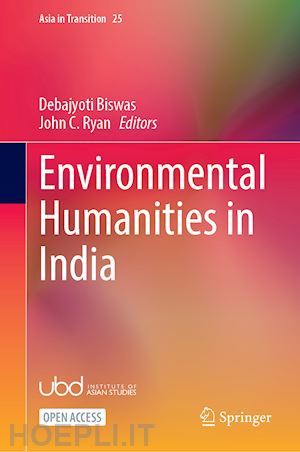

Questo prodotto usufruisce delle SPEDIZIONI GRATIS
selezionando l'opzione Corriere Veloce in fase di ordine.
Pagabile anche con Carta della cultura giovani e del merito, 18App Bonus Cultura e Carta del Docente
This open access book offers an introduction to the field of the environmental humanities in India. The environmental humanities, often referred to as ‘EH’, are a multifaceted, relatively new, and swiftly evolving field of scholarship that integrates the theories and approaches of various disciplines - from anthropology, art, communications, cultural studies, philosophy and ecology to history, literature, media, music, performance, politics, sociology, theology and theater. Practitioners of this considerably integrative and widely ranging field aim to address and, in certain cases, confront today's urgent ecological and cultural challenges, namely climate change, urban sustainability, biodiversity conservation, species decline, energy policy, the exigencies of the Anthropocene, environmental activism, and Indigenous peoples' justice. Although the environmental humanities have been relatively slow to gain traction in South Asia, an increasing momentum towards transdisciplinary approaches to ecology and sustainability is palpable in India. Comprising fourteen chapters, this contributed volume is the first major publication to call attention to current work in the environmental humanities in India. The volume foregrounds particular ecohumanist theories and methodologies evolving from Indian biocultural contexts. Towards this aim, the book consists of four thematic sections: Indigenous Perspectives: Conservation, Spirituality, and Language; Theoretical Grounding: Education, Law, and Ethics; Literary Formulations: Memoir, Parable, and Storyworlds; and Popular Narratives: Myth, Travel, and Music. The volume is of interest to undergraduates, postgraduates, early career scholars, and more established researchers in the environmental humanities and the allied fields of ecopoetics, ecocriticism, ecomusicology, environmental art, cultural ecology, postcolonial studies, and South Asian studies.
This is an open access book.
Introduction: Environmental Humanities in India.- 2. Indigenous Native Epistemology as A Model in Environmental Humanities in India.- 3. The Environment in Hindu Consciousness: Revisiting the Sacred Texts.- 4. Cultural Practices and Indigenous Traditions of the Garo and Bodo: Reinterpreting 'Man-Nature' Convergences in Wangala and Bathou.- 5. Indigenous Nature Conservation in Meghalaya: Environmental and Religious Dimensions of Tribal Land Ownership Among the Khasi Community.- 6. Philosophy for Environmental Policy and Law in India.- 7. The Secular in Ecological Consciousness.- 8. Multispecies Conviviality, Bioregionalism, And Vegetal Politics in Kodagu, India.- 9. “When The Black Half of The Kunni Seed Whitens”: Plant-Lore and The Plantationocene in Ambikasuthan Mangad’s Swarga.- 10. Mourning the Loss of Mother Earth: Reclaiming the Path of Recovery in Akkineni Kutumbarao’s Softy Dies a Lake.- 11. “Leave City, Leave Reality; Enter Forest, Enter Fantasy”: Representing Ecotopian Space as a Protest against Urbanization in Bibhutibhusan Bandyopadhyay’s Literary Oeuvre.- 12. Connecting and Creating Narratives: Interrogating Myth and Identity in Ghosh’s Gun Island.- 13. Amitav Ghosh’s Storyworlds for Environmental Dwelling: Multimodal Iterations and Performativity in/of Jungle Nama: A Story of the Sundarban.- 14. Ecomusicology in India: Voicing the Unvoiced Anthropocene through Popular Culture.
Debajyoti Biswas is Associate Professor & Head of the Department of English at Bodoland University. Debajyoti Biswas is an alumnus of Jawaharlal Nehru University and Gauhati University. He teaches Anglophone writings from India’s northeast and Critical Theory to Postgraduate students. His areas of interest include identity, nationalism, environment, and conflict in North East India. His writings have appeared in journals like Asian Ethnicity (T&F), National Identities (T&F), Journal for Cultural Research (T&F), Journal of Environmental Studies and Sciences (Springer), Journal of International Women's Studies (Bridgewater State University), English: A Journal of English Association (Oxford University Press), Policing (Oxford University Press), South Asian Popular Culture (T&F), Humanities and Social Sciences Communications (Nature), Space and Culture, India, and Postcolonial Studies (T&F). He has completed two minor research projects funded by the University Grants Commission (UGC) and is currently heading an ICSSR-funded Major research project (2024-2026) as a Project Director. He has co-edited two volumes entitled: Nationalism in India and Global Perspectives on Nationalism, published by Routledge. His monograph entitled Anglophone from Northeast India and Women’s Writing is forthcoming from Atlantic Publishers in 2024. He is the managing editor of transcript: An e-Journal of Literary and Cultural Studies, published by the Department of English, Bodoland University.
John Charles Ryan is an international researcher in literary studies, creative writing, and environmental humanities. He is Adjunct Associate Professor at Southern Cross University, Australia, and Adjunct Senior Research Fellow at the Nulungu Institute, University of Notre Dame, Australia. Funded by the Kone Foundation, his current research investigates possibilities for communication and collaboration between people and trees in Northern Finland. Ryan’s books include Environment, Media and Popular Culture in Southeast Asia (2022, Springer, co-edited) and Introduction to the Environmental Humanities (2022, Routledge, co-authored). He is Editor of the journal Plant Perspectives and Managing Co-Editor of The Trumpeter. In 2023–24, he undertook visiting fellowships in China, India, Indonesia, Finland, and Thailand. For more information, see www.johncharlesryan.com











Il sito utilizza cookie ed altri strumenti di tracciamento che raccolgono informazioni dal dispositivo dell’utente. Oltre ai cookie tecnici ed analitici aggregati, strettamente necessari per il funzionamento di questo sito web, previo consenso dell’utente possono essere installati cookie di profilazione e marketing e cookie dei social media. Cliccando su “Accetto tutti i cookie” saranno attivate tutte le categorie di cookie. Per accettare solo deterninate categorie di cookie, cliccare invece su “Impostazioni cookie”. Chiudendo il banner o continuando a navigare saranno installati solo cookie tecnici. Per maggiori dettagli, consultare la Cookie Policy.